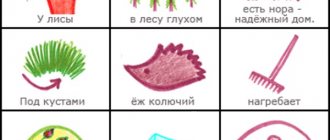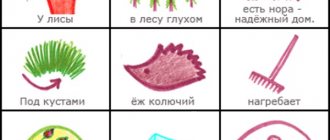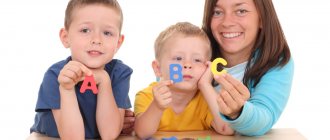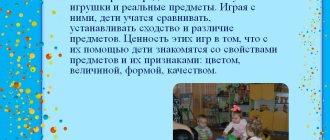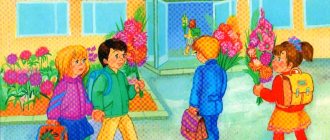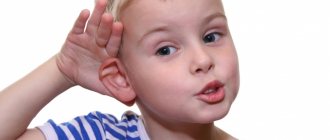Presentation “Speech development of a child in kindergarten”
MUNICIPAL STATE PRE-SCHOOL EDUCATIONAL INSTITUTION OF CHULYM DISTRICT KINDERGARTEN “SMILE”
Speech development in
preschool
Author of the presentation
teacher of the 1st qualification category Kiper T.V.
“Speech is an amazingly powerful tool,
but you need to have a lot of intelligence,
to use it"
G. Hegel
Relevance of the problem of speech development
Almost everyone can speak, but only a few of us can speak correctly. When talking with others, we use speech as a means of conveying our thoughts. Speech for us is one of the main needs and functions of a person. It is speech that distinguishes humans from other representatives of the animal world. It is through communication with other people that a person realizes himself as an individual. While observing the children, I noticed that not all children in the group have the same level of speech development: some pronounce words correctly, can express their request, communicate with each other, listen and understand the question asked, and can answer it. Others still do not speak clearly enough, pronounce words incorrectly, and find it difficult to select words for phrases due to the paucity of vocabulary. There are also those who do not understand the meaning of words and this leads to a misunderstanding of the content of the material being read and narrated.
I have been dealing with the problem of speech development for 8 years.
During this period, I studied and analyzed a lot of literature and came to the conclusion that it is necessary to trace the development of speech activity through: * Development of speech activity of preschool children through oral folk art (small folklore forms); * Connection of fine motor skills with speech; * Development of speech activity during restricted moments; * Club activities; * Project activities; * Interaction with parents.
The goal of my work in this direction is the speech development of children through all components of children’s oral speech.
Tasks:
- 1. Develop children's speech through a variety of gaming technologies.
- 2. Development and improvement of all aspects of each child’s oral speech (pronunciation, vocabulary, grammatical structure, coherent speech).
- 3. Development of fine motor skills of the hands.
- 4. Draw the attention of parents to the possibilities of developing the child’s communication sphere in the family and kindergarten.
Software and methodological support
Development of speech activity of preschool children through oral folk art (small folklore forms);
Works of folklore are priceless. Acquaintance with children's folklore develops interest and attention to the surrounding world and folk words. Speech develops, moral habits are formed.
Folklore is a unique means for transmitting folk wisdom and educating children at the initial stage of their development. Children's creativity is based on imitation, which serves as an important factor in the development of the child and his speech.
The connection between fine motor skills and speech.
The wonderful teacher V. A. Sukhomlinsky wrote that the origins of children’s abilities and talents are at their fingertips; from them, figuratively speaking, come the finest streams that feed the source of creative thought. The use of traditional and non-traditional techniques increased the efficiency of the development of fine motor skills in preschool children, and also contributed to the development of cognitive activity, speech development, and creative abilities of children.
The development of speech activity can take place not only in specially prepared classes, but also at other scheduled moments, throughout the entire time the preschooler is in kindergarten.
For the speech development of children and for independent artistic and speech activities, our group has created all the conditions: a book corner, a speech corner, a dressing corner, and an arts and crafts corner. The child acts in them voluntarily, because All opportunities have been created for the manifestation of subjectivity in communication.
“A child will not speak in empty walls”...
E. I. Tikheyeva.
Speech development while walking
Walking causes emotional and speech activity in children. During a walk, in addition to pre-planned games, I include games that help expand children’s vocabulary, their ability to construct sentences correctly, develop phonemic awareness, and fill in some of the gaps and difficulties the child has.
Club activities.
I not only taught children to compare different materials with each other, find commonalities and differences, create crafts from paper, fabric, leaves, boxes, etc. But she also put maximum effort into developing children’s creativity, imagination, fine motor skills, attention, logical thinking and perseverance. During the classes I used: poems, stories, proverbs and sayings, finger gymnastics, manual labor. As is already known, all this has a beneficial effect on speech development.
Project activities.
The use of the project method in preschool education as one of the methods of integrated training for preschoolers can significantly increase children’s independent activity, develop creative thinking, children’s ability to independently find information about an object or phenomenon of interest in different ways and use this knowledge to create new objects of reality, promotes enrichment and activation of children's vocabulary, development of coherent speech, development of the planning function of speech.
Interaction with parents
I believe that one of the most important areas in a teacher’s activity in developing children’s speech is interaction with parents. The child spends a lot of time outside the kindergarten: with his family, with peers in the yard, etc. A child masters speech more successfully when he is taught not only in a preschool educational institution, but also in the family. A correct understanding by parents of the tasks of upbringing and teaching, knowledge of some of the methodological techniques used by the teacher in working on the development of children's speech will undoubtedly help them in organizing speech classes at home. Over the eight years of work, I have repeatedly made a presentation at parent-teacher meetings, provided consultations, and prepared memos and moving folders.
What unconventional and new things did I use in my work?
Firstly, a multifunctional, educational simulator for the development of fine motor skills of the hands. I was inspired to create and use them by the work of E. V. Polozova “Developmental simulators from waste material,” where it is substantiated that with the help of these simulators children develop not only fine motor skills, but also thinking, perception, memory, attention, and an idea of shape, color, quantity.
Secondly, I use mnemonics in my work.
Mnemonics, or mnemonics, is a system of various techniques that facilitate memorization and increase memory capacity by forming additional associations.
Such techniques are especially important for preschoolers, since visual material is absorbed better than verbal material. “
Teach a child some five words unknown to him - he will suffer for a long time and in vain, but associate twenty such words with pictures, and he will learn them on the fly.”
K. D. Ushinsky
Conclusion
Working on the problem of “Speech development of a child in kindergarten” is a labor-intensive process. To achieve positive, tangible results, it must be conducted in a system. This system is as follows: kindergarten-child-family. I try to use a creative approach to this problem, using both standard forms of work and non-traditional ones. It is important to involve the family in resolving this issue. To interest parents, to increase their pedagogical competence. I intend to continue my line of work because I am interested in the problem of children’s speech development.
Bibliography.
Bolshova T.V. We learn from a fairy tale. Development of thinking in preschoolers using mnemonics. St. Petersburg, 2005. Bobrova Yu.O., Levshina N.I. “Speech development of preschool children in project activities” // International Journal of Experimental Education, No. 7-2/2014. Veraksa, N.E. Diagnostics of mental development and the problem of abilities / N.E. Veraksa, A.N. Veraksa // Modern preschool education. Theory and practice. – 2007. – No. 1. – P. 22 – 27. Volkovskaya, T.N., Yusupova G.Kh. Psychological assistance to preschool children with general speech underdevelopment. M., 2004. Kozlova S.A. , Kulikova T.A. "Preschool pedagogy: Proc. A manual for students. avg. ped. textbook Establishments.- 2nd ed. , processed and additional –M.: Publishing House, 2000. Lykova I.A. Visual activities in kindergarten: planning, lesson notes, methodological recommendations. Junior group. - M.: “KARAPUZ-DIDACTICS”, 2007. Martsinkovskaya T.D. "Children's practical psychology." M.: Gardariki, 2000. Miryasova V.I., Vasilyeva S.A. Linguist. Practical classes on the development of speech of preschoolers.-M.: Liberia-Bibinform, 2010. Ponomareva L.V. Modeling in descriptive speech of children with SLD. Preschool education.2004.No.6. P.64-68. Sokhin F.A. Psychological and pedagogical foundations of speech development in preschool children. Voronezh, Publishing house NPO "MODEK", 2002 Ushakova O.S. Poems for speech development. 4-7 years old/ O.A. Novikovskaya.-M.: Astrel-SPb, 2009. Theory and practice of speech development in preschool children. – M., Sphere shopping center. 2008 Shakhnarovich A.M. General psycholinguistics. M., 1995. Ushakova, O.S. Theory and practice of preschooler speech development: Developing speech.-M: TC Sfera, 2008. Ushakova O.S., Gavrish N.V. Introducing literature to children 3-5 years old - Creative Center, Moscow, 2009 Ushakova O.S. Familiarization of preschoolers with literature and speech development: Methodological manual. - M.: TC Sfera, 2011. Federal State Educational Standard for Preschool Education / https://www.rg.ru/2013/11/25/doshk-standart-dok.html Internet resources: nsportal.ru Maam/ru magazines “Preschool Education”: No. 6, 2004 ; No. 5, 2007; No. 6, 2007.
Thank you for your attention!
Presentation “Speech games for children of senior preschool age”
Larisa Pilnikova
Presentation “Speech games for children of senior preschool age”
Forming the correct pronunciation of sounds is one of the most important areas in correctional speech therapy work. It often happens that a child quickly manages to produce a sound, but it is very difficult to automate and introduce the given sound into independent speech. As a rule, a child will be able to freely use a given sound only after repeated repetition of this sound in words and sentences. But mechanical repetition of the same word tires children and does not stimulate them to use it independently.
I. A. Smirnova notes that a speech therapist must form in the child the motives and volitional qualities necessary for long-term work that give stable results. And this must be done easily, naturally, in a playful way, interest- ing the child.
Practical knowledge of a language presupposes the ability to distinguish by ear and correctly reproduce all sound units of the native language. Therefore, work on developing the pronunciation of sounds in preschoolers should be carried out systematically. Observations of articulation in children create the basis not only for the formation of speech hearing , but also for the development of a culture of oral speech in its pronunciation aspect. Observing their own speech leads to the fact that children, understanding the meaning of a word, begin to associate it with the sounds that make up these words. From here begins the observation of the pronunciation of the word, the alternation of vowels and consonants.
To form the correct pronunciation of sounds, it is important to make maximum use of visualization and gaming techniques, given that play is the leading activity for a preschooler . Thanks to the use of games, the process of automating the delivered sounds takes place in a form that is accessible and attractive to children . The work of the organs of hearing and vision is important in correcting pronunciation deficiencies and developing phonemic perception. Also, special attention is paid to the work of the motor analyzer (hands)
.
It is known that the motor and speech centers in the cerebral cortex are located nearby, therefore the mobility of the articulatory apparatus is determined by the state of the motor sphere. During the game, children experience the cumulative work of all analyzers, which allows for the most effective correctional work.
—
Contents and stages of project implementation
Organizational and preparatory stage
- Monitoring of speech development of older preschool children, data processing
- Studying methodological literature on the topic “Speech development of children.” Work with periodicals “Preschool Education”, “Hoop”, “Directory of a Senior Preschool Teacher”, “Preschooler”.
- Development of activities on the project topic, compilation of notes on educational activities
- Questioning parents
- Self-assessment of the professionalism of teachers in the section of speech development of preschool children.
Main stage.
- Replenishment of the developing subject-spatial environment with didactic aids, games, schematic material, mnemonic tables, algorithms, demonstration material
- Conducting various forms of educational activities to develop coherent speech in preschoolers.
- Selection of books, fairy tales, poems, riddles for the library, inviting children to participate in inventing fairy tales, riddles, etc.
- Familiarity with the basic methods of transcoding information, the use of conditional graphic models by children in games.
- Increasing the competence of teachers in the development of children’s speech behavior, the formation of practical skills in expressive speech in kindergarten and family settings.
- Involving parents in joint creative and speech activities.
Implementation of the main stage. Working with students
| Events | Groups | Time spending | Responsible |
| -Entertainment “Cheerful Palms” -“Finger Theatre” -Game activity “Visiting Magpies - White-sided” -Sand play therapy “Sand Yard” - Didactic games and exercises - Memorizing poems and nursery rhymes - Examination of toys, books, illustrations - OD for training children's storytelling - conversation - dialogue on the topic of the week - listening to audio tales | Junior groups | During the project | Music directors, teachers |
| “Along the speech path” – development of children’s speech using mnemonics; — Use of visual forms of symbolization when retelling and memorizing; – Drawing competition “My favorite fairy tales”; – Educational games “Me and my speech”; – Verbal outdoor games; – Guessing and composing riddles; – Creative tasks – Printed board and didactic games – Theatricalization of fairy tales – OD on teaching children to tell stories – conversation – dialogue on the topic of the week – listening to audio tales – physical education “Living Riddles” | Middle groups | During the project | Teachers, physical education instructor |
| - Literary game - quiz: “Fairy tale, I know you” - “Chest of riddles” (composing riddles using mnemonics) - Game - dramatization: “A fairy tale come to life” - Teaching the technique of telling a fairy tale using a table, diagram; – “Name and describe the hero of the fairy tale” (collage); – Using the technique of changing the plot of a fairy tale: “What will happen if...” – Drawing based on a fairy tale: “Let’s draw a fairy tale” – Writing fairy tales “Funny compositions” – Speech games with movement – Creating baby books – Action “Give a book to kids” – OD on education children's storytelling - conversation - dialogue on the topic of the week - listening to audio tales | Senior groups | During the project | Educational psychologist, educators |
| — Solving crosswords, puzzles, puzzles; – speech trainings with children; – work with diagrams; – dynamic studies; – games – travel through the “Land of beautiful and literate speech” – writing letters: to your friend; for transmission; letter to peers in another kindergarten; letters are riddles; invitation letter. — Writing fairy tales in a new way — Rhythmoplasty — Making the album “We love fairy tales” — Speech quiz “Journey to the land of magic words” — Dramatization games based on familiar fairy tales Creation of baby books — Campaign “Give a book to kids” — OD on teaching children to tell stories — conversation — dialogue on the topic of the week — listening to audio tales | School preparatory groups | During the project | Educational psychologist, educators |
Working with teachers
| Events | Time spending | Responsible |
| Consultation “Formation of coherent speech in preschoolers” | ||
| Seminar “Features of work on the development of coherent speech in preschool children” | Educators: | |
| Express survey of teachers “Speech development” | Senior educator, speech therapist | |
| Consultation “Innovative approach to the development of coherent speech in preschoolers” | Educator. | |
| Open viewings of educational activities for the NGO “Speech Development” | Educators: | |
| Festival of Pedagogical Ideas “Presentation – advertising a game for the development of coherent speech in preschoolers” | Senior teacher, teachers | |
| Master class “Planning the environment for the NGO “Speech Development” | Educator | |
| Drawing up a memo for teachers “Teacher’s Speech” | Educational psychologist | |
| Quiz for teachers “It’s nice to hear beautiful speech” | Educational psychologist | |
| Mini competition review | Commission members, teachers | |
| “Piggy Bank for Parents” - reminders, practical tasks, tips, recommendations | During the project | Educators, specialists |
Interaction with parents
| Events | Groups | Time spending | Responsible |
| Questioning parents “Your child’s speech” | All | January 2016 | Educational psychologist |
| Group parent meetings on the project topic | All | During the project | Educators |
| Promotion “Give a book to a group” | All | During the project | Educators |
| Posting material on the preschool educational institution website | All | During the project | Educational psychologist |
| Placing visual information in parent corners on the topic of the project | All | During the project | Educators |
| Creation of the “Book of Fairy Tales”, “Box of Fairy Tales” (joint creativity of children and parents) | All | During the project | Educators |
| Issue of the newspaper "Ladushki" | At the end of the project | Music directors | |
| Participation of parents in the production of teaching aids and games for the festival “Presentation - advertising a game for the development of coherent speech in preschoolers” | All | During the project | Educators |
| Release of the wall newspaper “Our Children Tell” | All | During the project | Educators |
